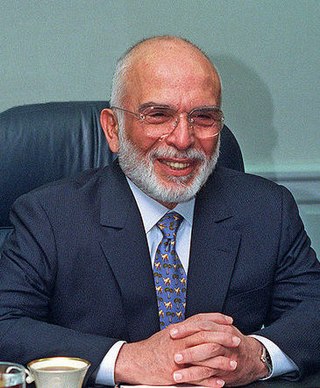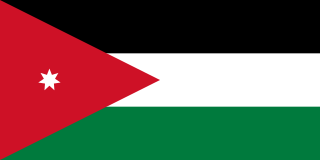
Jordan has a population of more than 11.1 million inhabitants as of 2023. Jordanians are the citizens of Jordan. Around 94% of Jordanians are Arabs, while the remaining 6% belong to other ethnic minorities, including Circassians, Chechens, Armenians and Kurds. Around 2.9 million inhabitants are non-citizens, a figure including refugees, legal and illegal immigrants. Jordan's annual population growth rate stands at 3.05% as of 2023, with an average birth rate of 2.8. There were 1,977,534 households in Jordan in 2015, with an average of 4.8 persons per household.

This is a demography of the population of Lebanon including population density, education level, health of the populace, economic status, religious affiliations and other aspects of the population.
Palestinian refugees are citizens of Mandatory Palestine, and their descendants, who fled or were expelled from their country over the course of the 1947–1949 Palestine war and the Six-Day War. Most Palestinian refugees live in or near 68 Palestinian refugee camps across Jordan, Lebanon, Syria, the West Bank and the Gaza Strip. In 2019 more than 5.6 million Palestinian refugees were registered with the United Nations.

Hussein bin Talal was King of Jordan from 11 August 1952 until his death in 1999. As a member of the Hashemite dynasty, the royal family of Jordan since 1921, Hussein was a 40th-generation direct descendant of Muhammad.

Abdullah II bin Al-Hussein is King of Jordan, having ascended the throne on 7 February 1999. He is a member of the Hashemite dynasty, who have been the reigning Royal family of Jordan since 1921, and is considered a 41st-generation direct descendant of the Islamic prophet Muhammad.

Amman New Camp or Al-Wehdat camp, locally known as Al-Wihdat, which is located in the Hay Al Awdah neighbourhood, in southeast Amman, the capital city of Jordan occupies a 0.48 km2 (0.19 sq mi), Of the ten recognized Palestinian refugee camps in Jordan, Al-Wehdat is the second largest, with a population of roughly 57,000 registered refugees, which includes 8,400 students. The United Nation body responsible for administrating Palestinian refugee camps, is the Relief and Works Agency for Palestinian Refugees in the Near East (UNRWA).
In international law, a stateless person is someone who is "not considered as a national by any state under the operation of its law". Some stateless people are also refugees. However, not all refugees are stateless, and many people who are stateless have never crossed an international border. At the end of 2022, the United Nations High Commissioner for Refugees estimated 4.4 million people worldwide as either stateless or of undetermined nationality, 90,800 (+2%) more than at the end of 2021.

The Jordanian administration of the West Bank officially began on April 24, 1950, and ended with the decision to sever ties on July 31, 1988. The period started during the 1948 Arab-Israeli War, when Jordan occupied and subsequently annexed the portion of Mandatory Palestine that became known as the West Bank, including East Jerusalem. The territory remained under Jordanian control until it was occupied by Israel during the 1967 Six Day War and eventually Jordan renounced its claim to the territory in 1988.

Zarqa is the capital of Zarqa Governorate in Jordan. Its name means "the blue (city)". It had a population of 635,160 inhabitants in 2015, and is the second most populous city in Jordan after Amman.

Refugees of Iraq are Iraqi nationals who have fled Iraq due to war or persecution. In 1980- 2017, large number of refugees fled Iraq, peaking with the Iraq War and continuing until the end of the War in Iraq (2013–2017). Precipitated by a series of conflicts including the Kurdish rebellions during the Iran–Iraq War, Iraq's Invasion of Kuwait (1990) and the Gulf War (1991), the subsequent sanctions against Iraq (1991–2003), culminating in the Iraq War and the subsequent War in Iraq (2013–2017), millions were forced by insecurity to flee their homes in Iraq. Iraqi refugees established themselves in urban areas in other countries rather than refugee camps.

Palestinians in Iraq are people of Palestinians, most of whom have been residing in Iraq after they were displaced in 1948. Before 2003, there were approximately 34,000 Palestinians thought to be living in Iraq, mainly concentrated in Baghdad. However, since the 2003 Iraq War, the figure lies between 10,000–13,000, although a precise figure has been hard to determine. The situation of Palestinians in Iraq deteriorated after the fall of Saddam Hussein and particularly following the bombing of the Al-Askari Mosque in 2006. Since then, with the rise in insecurity throughout Iraq, they have been the target of expulsion, persecution and violence by Shia militants, and the new Iraqi Government with militant groups targeting them for preferential treatment they received under the Ba'ath Party rule. Currently, several hundred Palestinians from Iraq are living in border camps, after being refused entry to neighbouring Jordan and Syria. Others have been resettled to third countries.

The Parliament of Jordan is the bicameral Jordanian national assembly. Established by the 1952 Constitution, the legislature consists of two houses: the Senate and the House of Representatives.
Articles related to Jordan include:

Palestinians in Syria are people of Palestinian origin, most of whom have been residing in Syria after they were displaced from their homeland during the 1948 Palestinian expulsion and flight. Palestinians hold most of the same rights as the Syrian population, but cannot become Syrian nationals except in rare cases. In 2011, there were 526,744 registered Palestinian refugees in Syria. Due to the Syrian Civil War, the number of registered refugees has since dropped to about 450,000 due to many Palestinians fleeing to Lebanon, Jordan or elsewhere in the region to escaping to Europe as refugees, especially to Germany and Sweden.
Syrians in Lebanon refers to the Syrian migrant workers and, more recently, to the Syrian refugees who fled to Lebanon during the Syrian Civil War. The relationship between Lebanon and Syria includes Maronite-requested aid during Lebanon's Civil War which led to a 29-year occupation of Lebanon by Syria ending in 2005. Following the outbreak of the Syrian Civil War, refugees began entering Lebanon in 2011. Lebanon's response towards the influx of refugees has been criticized as negative, with the Lebanese government leaving them undocumented and limited and attacks on Syrian refugees by Lebanese citizens which go unaddressed by authorities. Despite the strained relationship between the Syrians and Lebanese, taking into consideration only Syrian refugees, Lebanon has the highest number of refugees per capita in the world, with one refugee per four nationals. The power dynamic and position of Syria and Lebanon changed drastically in such a short amount of time, it is inevitable that sentiments and prejudices prevailed despite progressions and changes in circumstance.
Syrians in Jordan include migrants from Syria to Jordan, as well as their descendants. The number of Syrian refugees in Jordan is estimated at around 662,010 people registered as of July 2019,. The number of Syrians stands at 1.266 million, according to the 2015 Population and Housing Census.

Jordanian nationality law details the conditions by which a person is a national of Jordan. The primary law governing nationality regulations is the Jordanian Nationality Law, which came into force on 16 February 1954.
During the occupation of Iraq, Palestinians who lived in the country became the targets of violence, killings and scapegoating by Shia militant groups.
The Al-Hassan camp is a Palestinian refugee camp located some 5 Km from the center of Amman, the capital of Jordan. Administratively it lies in the Amman (Capital) Governorate.












